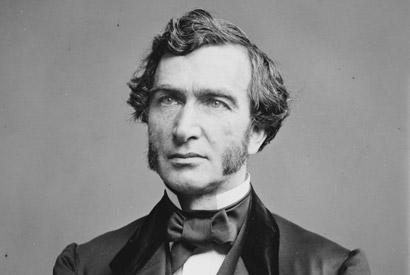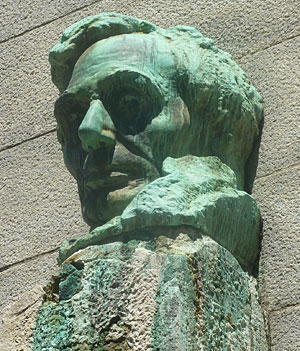150th anniversary for Civil War-era law that helped bring UC into being
One hundred and fifty years ago, as the Civil War raged, President Abraham Lincoln signed a law that would lead to the founding on the University of California six years later. An informal commemoration of the Morrill Land Grant Act was Monday at the Campanile.

June 29, 2012
One hundred and fifty years ago, tens of thousands of Union and Confederate soldiers fought a series of bloody battles known simply as the “Seven Days,” outside the rebel capital of Richmond. On July 2, 1862, President Abraham Lincoln turned his attention from the war and signed a law that would have a profound effect on the future University of California.

Bust of Abraham Lincoln hangs on the Campanile’s south base, legacy of his key role in the founding of UC. (Steve Finacom photo)
What has since become known as the Morrill Land Grant Act — after its sponsor, Vermont Representative Justin Morrill — set in place a system of federal funding for public institutions that would agree to “teach such branches of learning as are related to agriculture and the mechanic arts … in order to promote the liberal and practical education of the industrial classes…”
In essence, the Morrill Act helped spark, and fuel, the creation and early growth of a multitude of public education institutions and began democratizing American higher education, which had largely been the domain of private colleges, many of them established by specific religious denominations.
The mechanism involved generous grants of federally owned land, especially abundant in the new states of the West and Midwest, to be sold to support and endow public colleges. The act eventually led to the creation of 68 colleges nationwide.
The State of California took advantage of the Morrill Act funding in 1868, when the University of California was chartered. In return, the new institution put agricultural and other “practical” research and teaching front and center in the curriculum, reaping vast educational and economic benefits for California’s farmers and industries in the decades since. The university also committed to provide military training, one of the reasons ROTC programs remain part of the Berkeley campus today.
Berkeley holds no official ceremony to commemorate the anniversary — technically a sesquicentennial. But a group of current and former campus staff interested in campus history (including this writer) held an informal gathering Monday, next to the bust of Abraham Lincoln at the south base of the Campanile.
During a sunny, breezy, lunch hour nearly 40 people turned out to commemorate the Morrill Act anniversary. Attendees included staff, alumni, faculty, students, community scholars and local historians, as well as representatives of campus ROTC programs. Blueberry juice, cranberry juice, and white lemonade were poured in a patriotic toast. Harvey Helfand, retired campus planner and author of a definitive architectural guidebook to the Berkeley campus, spoke about the origins of the Lincoln bust. The anniversary was also celebrated with poetry and a ringing concert of music recalling the 1860s on the Campanile carillon arranged and played by David Hunsberger, a senior analyst in Capital Projects and frequent carillon player.
The University of California an article with more details on the Morrill Act and UC’s history, complete with an audio slide show.
Other good online resources on the history and impact of the Morrill Act on the university of California, including a commentary by current UC President Mark Yudof. Among them are:
A capsule history of UC and the Morrill Act.
A detailed commentary by UC President Mark Yudof.
A photo essay.
Information about a statewide celebration of the Morrill Act involving UC leadership, held in Sacramento April 30:
The website of the Association of Public and Land-Grant Universities, which was once headed by former Berkeley Chancellor Robert Berdahl and has a special section the Morrill Act anniversary.